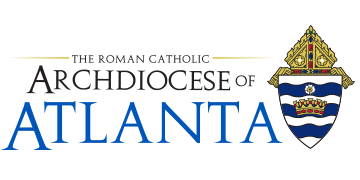Goals and Philosophy of Curriculum
At the core of a Catholic education are the beliefs and teachings of the church. While curriculum documents can reflect these realities in written form it is the responsibility of all that minister in Catholic schools to bring them to life in themselves and their students.
Catholic School curriculum highly values the elements of message, community, service, and worship. Through an exploration of each, learners acquire a deeper understanding essential for their growth and development. Such an approach necessitates a vision of curriculum, which is non-biased and inclusive.
For a curriculum series to have validity,the learner must be its central focus. Planned courses should be developmentally responsive. Instruction should be engaging and cause active participation. Secular subject areas should be represented as the universal truths, reflecting the history and tradition of the Church. Subject areas should acknowledge the present, study and reflect on the past and assume a posture of openness to the future.
When developing curriculum, the unique features of each school should be taken into consideration. All professional educators should understand it, which drives the educational process. This document allows teachers to make implementation decisions on a local level for the improvement of educational programs.
Goals of Curriculum
- Communicate the Gospel message.
- Engender a sense of responsibility as members of a church community.
- Empower learners to accept responsibility for the acquisition and use of knowledge.
- Cultivate a desire for continuous learning through formal and informal education.
- Engender a sense of responsibility as citizens within a democracy.
- Empower learners to make informed choices.
- Use independent and critical thinking.
- Strive toward connectedness of all learning.
- Implement instruction, which is developmentally appropriate.
- Strive toward clear and accurate communication through the development of a variety of skills.
- Represent all subject areas resulting in comprehensive literacy.
- Use all available technologies to support instruction.
- Implement effective prevention programs as early as possible for students who demonstrate learning challenges.
- To ensure a thorough foundation of knowledge for successful transition into secondary study.
Graduate Profile
Graduates of Catholic Schools in the Archdiocese of Atlanta are…
Disciples of Christ who…
Are centered on Gospel values,
Recognize the gifts they have been given by God,
Are willing to serve others in their community and beyond,
Understand and live their faith according to God’s will.
Life long learners who…
Have mastered the appropriate basic skills and concepts,
Are able to apply what they have learned to real life situations,
Are able to use technology as problem solving tools,
Are able to think critically, communicate effectively, and work collaboratively.
Well rounded individuals who…
Make wise ethical and moral decisions,
Are self-confident, self-disciplined people of integrity,
Are creative and open minded,
Are respectful and productive citizens.

